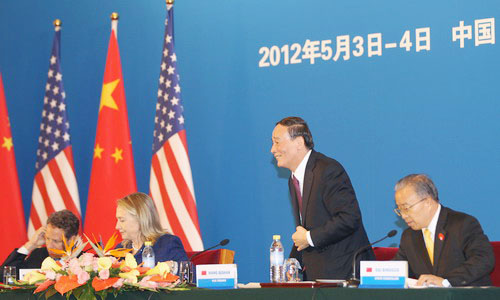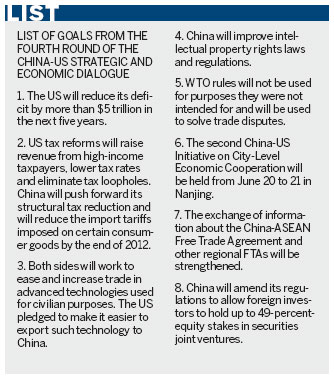|
 (From right) State Councilor Dai Bingguo, Vice-Premier Wang Qishan, US Secretary of State Hillary Clinton and Secretary of the Treasury Timothy Geithner address the media after the China-US Strategic and Economic Dialogue ended in Beijing on Friday. [Photo/China Daily] |
|
 Xie Zhenhua (right), China's chief climate change negotiator and vice-minister of the National Development and Reform Commission, talks with Todd Stern, the US special envoy for climate change, at the fourth round of the China-US Strategic and Economic Dialogue at the Diaoyutai State Guesthouse in Beijing on Friday. [Photo/China Daily] |
China vows to open up financial market wider to foreign investors
The United States will quicken its examination and approval for Chinese financial institutions that apply to invest in the US, as part of the achievements in the fourth round of the China-US Strategic and Economic Dialogue.
|
 |
Both delegations said on Friday that they were deeply encouraged by the results, while President Hu Jintao said there have been "significant agreements" in this round of talks.
The two countries reached 67 agreements in the economic dialogue, covering a wide range of issues in the macro economy, bilateral trade and investment as well as financial cooperation.
"There is significant progress in financial cooperation between the US and China," said Vice-Minister of Finance Zhu Guangyao.
According to Zhu, the US is now quickening its examination and approval process on the Bank of China and Agricultural Bank of China's applications for opening more branches in the US and the Industrial and Commercial Bank of China's initiative to take over Bank of East Asia (US).
In 2010, the Industrial and Commercial Bank of China, the world's largest lender by market value, completed the acquisition of a 70-percent stake of Bank of East Asia Canada to expand its business in North America.
China will revise regulations to allow foreign investors to raise their stakes in joint venture securities companies and joint venture futures companies to as much as 49 percent.
Foreign investors' ownership in securities firms is capped at 33 percent.
"This is a signal from China's policymakers to further open financial markets," said Sun Zhe, a professor at Tsinghua University's department of international relations. "But the two countries should further quicken the process of promoting bilateral trade and investment."
Morgan Stanley and JPMorgan Chase are among US banks that may gain more control over underwriting operations in China, the second-biggest market for share sales in 2011 after the US, according to data compiled by Bloomberg.
Goldman Sachs Group and UBS AG are the only foreign firms to currently have management control over their local ventures.
"We welcome this policy change, which we believe will create new business momentum and help further enhance China's securities industry and capital markets," Li Xu, a spokeswoman for Morgan Stanley, was cited by Bloomberg as saying.
China has made significant and promising reforms to its currency regime that will lead to further appreciation of the yuan against the dollar and other major currencies over time, US Treasury Secretary Timothy Geithner said on Friday.
"China has acted to move toward a more flexible exchange rate system in which the market plays a greater role. It is intervening less in exchange markets. China is also moving to liberalize controls on the international use of its currency and on capital movements into and out of the country," Geithner said.
Moreover, the US said it is committed to loosening restrictions on high-tech exports to China soon.
According to Yukon Huang, a senior associate at the Carnegie Endowment for International Peace and the former World Bank country director for China, the US restrictions on high-tech exports to China are extremely rigid.
"It doesn't make much sense from a national security point of view as China can easily get them from somewhere else," Huang said.
International issues
US Secretary of State Hillary Clinton said on Friday that both sides discussed hot spot issues ranging from the Democratic People's Republic of Korea and Iran to Sudan and Syria.
Every problem has provided an opportunity for cooperation, she said.
Clinton said she expected the mechanism only to be consolidated in the future, although some of the four representatives will leave their current position and say farewell to the Strategic and Economic Dialogue.
State Councillor Dai Bingguo called the talks a "tremendous" success.
He said on Friday the small-scale strategic talks, which usually touch upon sensitive issues, were the most time-consuming of all talks in this round.
"It took a whole day yesterday" he said, adding both sides have been more candid than before and have become accustomed to in-depth talks with each other.
He also noted that human rights should not be used to "interfere in other countries' internal affairs" and that no country could claim to be perfect in that regard.
According to the Foreign Ministry, among dozens of achievements on the strategic channel, the two sides decided to hold another round of consultation on Asia-Pacific affairs later this year, and a human rights dialogue in Washington in the summer.
A meeting on Middle East affairs was also put on the agenda. In addition, both sides are considering sending a Chinese maritime security ship to Hawaii in September for a joint drill with a US Coast Guard ship.
Earlier on Friday, President Hu Jintao, Premier Wen Jiabao and Vice-Premier Li Keqiang met the US delegates.
Hu said this round of talks reached several "significant agreements" and expressed appreciation for the "excellent work".
Clinton told Hu the US-China relationship is "stronger than it has ever been".
"There is a lot of work ahead of us, but we will find more and more opportunities for cooperation," she said.
"We have developed a very open and honest relationship where we can discuss our differences, and we remain committed to bridging those differences whenever and wherever possible," she said.
Zhao Kejin, an expert on strategy and diplomatic studies with Tsinghua University, said this round of talks is an "updated version" of the previous three rounds.
"The relations of the two nations are no longer only a bilateral one but exert an impact on other places in the world. So we say Beijing and Washington must talk to have people around the world rest assured."
Contact the writers at [email protected] and [email protected]
Cheng Guangjin and Zhang Yunbi in Beijing and Ariel Tung in New York contributed to this story.
|
 |
